Tens of thousands of people took to the streets of Taipei yesterday to protest the death of army corporal Hung Chung-chiu (洪仲丘), who allegedly died from abuse while serving in the military.
Singing a Taiwanese version of the revolutionary song Do You Hear the People Sing? — one of the songs from the musical Les Miserables — white-clad protesters rallied on Ketagalan Boulevard in front of the Presidential Office, demanding that the military reveal the truth about Hung’s death and calling for the government to push for better protection of human rights in the military.
The demonstration was held on the eve of Hung’s funeral and attracted 200,000 people, according to event organizer and activist group Citizen 1985. Police estimated the crowd as numbering 110,000.
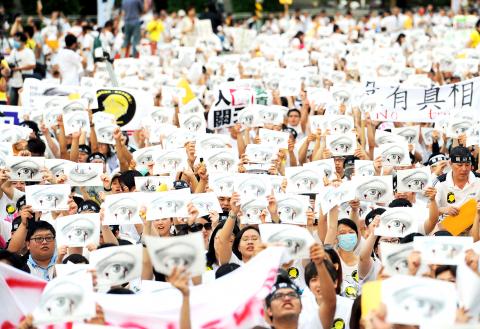
Photo: Lo Pei-der, Taipei Times
The group had previously said that it hoped “to attract 100,000 people to the rally to bid Hung farewell and push the government to investigate the case impartially.”
Among other appeals made by the demonstrators were calls for the Special Investigation Division to immediately launch a probe into the case, a review all similar cases reported in the past and the passage of legislation to allow service personnel to be tried in civilian courts in peace time rather than by court-martial.
Hung, a National Cheng Kung University graduate, died of heatstroke on July 4, following exercises he was forced to do as part of his punishment while confined to detention barracks for bringing a camera-equipped cellphone onto his base on June 28 without permission.
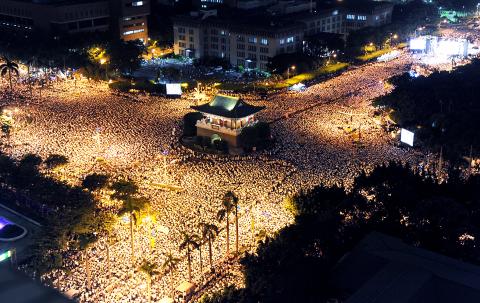
Photo: Lo Pei-der, Taipei Times
His death, just two days before he was due to be discharged after completing his year-long compulsory military service, has sparked a public outcry, with thousands of protesters holding a rally in front of the Ministry of National Defense on July 20 to demand an investigation.
Military prosecutors have found that some of the defendants held grudges against Hung and had colluded to bypass standard disciplinary procedures in order to subject him to punishment that was more severe than his offense merited.
Eighteen army officers have been indicted on charges of causing the death of a subordinate, impinging upon individual freedom or handing out unauthorized punishments.
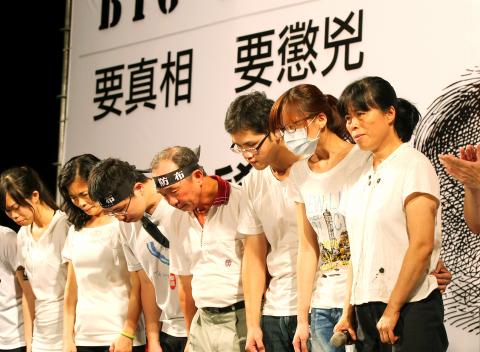
Photo: CNA
All four army personnel detained during the investigation were released on bail on Thursday and Friday, a decision by the military court that the Hung family said it would appeal.
“Thank you everyone for helping us find the truth,” Hung’s mother, in tears, told the crowd, which responded by chanting “Go, go, go” as an encouragement to the family.
“On July 3, I received a call and rushed to the hospital, where the person I saw was not my son, but a body with many medical tubes coming out of it,” she said. “July 3 was the most heart-breaking day of my life. I cannot not believe that my healthy, active son is gone forever.”
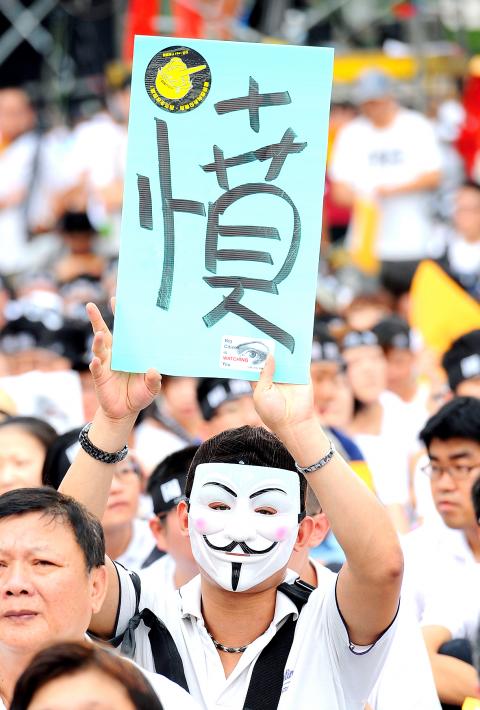
Photo: Chang Chia-ming, Taipei Times
“The military told me heatstroke was the reason for [his] death,” she said. “In the month since then, we have waited, but we have not been given the truth, honesty and justice we were promised.”
During the protest, demonstrators shouted slogans and held placards bearing messages such as “We want the truth,” “We want the perpetrators to be punished,” “We want reform” and “The president must take responsibility for human rights in the military.”
“I am mourning for Hung and I want the truth. I hope there won’t be any more abuse and deaths like his in the military,” protester Jenny Tan said.
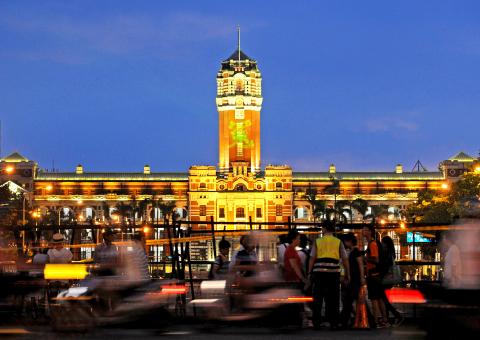
Photo: CNA
The demonstrators also projected the Chinese characters yuan (冤, “injustice” or “wronged”) and zhen xiang (真相, “truth”) on the Presidential Office with LED lights.
They also observed a 30-second silence for Hung.
The Taoyuan District Prosecutors’ Office, which on Friday said there had been no tampering with the surveillance footage of the holding cell where Hung was confined prior to his death, has said it will continue its investigation into whether a military hospital should be held accountable for document forgery and involuntary manslaughter.
The Cabinet called a press conference at 9:50pm in response to the demands.
Premier Jiang Yi-huah (江宜樺) said the Executive Yuan will establish a commission comprising officials and representatives from human rights groups and civil groups, to re-investigate possible cases of human rights abuses in the military.
The Executive Yuan will also push for the revision of the Code of Court Martial Procedure (軍事審判法) to allow cases of abuse in the military to be reviewed in civil courts in peace time rather than by court-martial.
Jiang pledged the government will spare no effort to investigate Hung’s case to uncover the truth and to thoroughly review the military disciplinary procedures.
Additional reporting by Shih Hsiu-chuan

CHAOS: Iranians took to the streets playing celebratory music after reports of Khamenei’s death on Saturday, while mourners also gathered in Tehran yesterday Iranian Supreme Leader Ayatollah Ali Khamenei was killed in a major attack on Iran launched by Israel and the US, throwing the future of the Islamic republic into doubt and raising the risk of regional instability. Iranian state television and the state-run IRNA news agency announced the 86-year-old’s death early yesterday. US President Donald Trump said it gave Iranians their “greatest chance” to “take back” their country. The announcements came after a joint US and Israeli aerial bombardment that targeted Iranian military and governmental sites. Trump said the “heavy and pinpoint bombing” would continue through the week or as long

TRUST: The KMT said it respected the US’ timing and considerations, and hoped it would continue to honor its commitments to helping Taiwan bolster its defenses and deterrence US President Donald Trump is delaying a multibillion-dollar arms sale to Taiwan to ensure his visit to Beijing is successful, a New York Times report said. The weapons sales package has stalled in the US Department of State, the report said, citing US officials it did not identify. The White House has told agencies not to push forward ahead of Trump’s meeting with Chinese President Xi Jinping (習近平), it said. The two last month held a phone call to discuss trade and geopolitical flashpoints ahead of the summit. Xi raised the Taiwan issue and urged the US to handle arms sales to

State-run CPC Corp, Taiwan (CPC, 台灣中油) yesterday said that it had confirmed on Saturday night with its liquefied natural gas (LNG) and crude oil suppliers that shipments are proceeding as scheduled and that domestic supplies remain unaffected. The CPC yesterday announced the gasoline and diesel prices will rise by NT$0.2 and NT$0.4 per liter, respectively, starting Monday, citing Middle East tensions and blizzards in the eastern United States. CPC also iterated it has been reducing the proportion of crude oil imports from the Middle East and diversifying its supply sources in the past few years in response to geopolitical risks, expanding

An Emirates flight from Dubai arrived at Taiwan Taoyuan International Airport yesterday afternoon, the first service of the airline since the US and Israel launched strikes against Iran on Saturday. Flight EK366 took off from the United Arab Emirates (UAE) at 3:51am yesterday and landed at 4:02pm before taxiing to the airport’s D6 gate at Terminal 2 at 4:08pm, data from the airport and FlightAware, a global flight tracking site, showed. Of the 501 passengers on the flight, 275 were Taiwanese, including 96 group tour travelers, the data showed. Tourism Administration Deputy Director-General Huang He-ting (黃荷婷) greeted Taiwanese passengers at the airport and